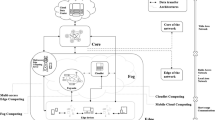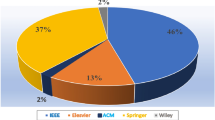Abstract
This paper discusses the challenges of mobile edge computing with low latency and energy consumption caused by the explosive growth of communication traffic and data generated by mobile devices. To address the issue of selecting edge servers, a multi-user-oriented edge server selection strategy is proposed. The strategy minimizes the weighted sum of network latency and total energy consumption and develops an improved SPEA2-based algorithm to choose the most suitable edge server. The resource allocation problem is also considered, and a resource allocation strategy is proposed that maximizes the energy efficiency ratio. A DQN-based resource allocation strategy is devised to find the best resource allocation strategy. Experimental results demonstrate that the proposed server selection strategy reduces system overhead in terms of energy consumption and latency while improving resource utilization. The resource allocation strategy improves the computational efficiency of edge servers while reducing latency and total energy consumption.











Similar content being viewed by others
Availability of data and materials
No associated data.
References
Liu, J., Li, C., Bai, J., Luo, Y., Lv, H., & Lv, Z. (2023). Security in IoT-enabled digital twins of maritime transportation systems. IEEE Transactions on Intelligent Transportation Systems, 24(2), 2359–2367.
Lyu, N. (2021). Brief review on computing resource allocation algorithms in mobile edge computing. https://doi.org/10.1109/cds52072.2021.00025.
Xu, J., Lin, J., Li, Y., & Xu, Z. (2023). MultiFed: A fast converging federated learning framework for services QoS prediction via cloud–edge collaboration mechanism. Knowledge-Based Systems, 268, 110463. https://doi.org/10.1016/j.knosys.2023.110463
Chen, J., Xing, H., Xiao, Z., Xu, L., & Tao, T. (2021). A DRL agent for jointly optimizing computation offloading and resource allocation in MEC. IEEE Internet of Things Journal, 8(24), 17508–17524. https://doi.org/10.1109/jiot.2021.3081694
Alqarni, M., Cherif, A., & Alkayyal, E. (2023). ODM-BCSA: An offloading decision-making framework based on binary cuckoo search algorithm for mobile edge computing. Computer Networks, 226, 109647. https://doi.org/10.1016/j.comnet.2023.109647
Wu, Y.-C., Dinh, T. Q., Fu, Y., Lin, C., & Quek, T. Q. S. (2021). A hybrid DQN and optimization approach for strategy and resource allocation in MEC networks. IEEE Transactions on Wireless Communications, 20(7), 4282–4295. https://doi.org/10.1109/twc.2021.3057882
Fang, F., Wang, K., Ding, Z., & Leung, V. C. M. (2021). Energy-efficient resource allocation for NOMA-MEC networks with imperfect CSI. IEEE Transactions on Communications, 69(5), 3436–3449. https://doi.org/10.1109/tcomm.2021.3058964
Li, C., Qianqian, C., & Luo, Y. (2022). Low-latency edge cooperation caching based on base station cooperation in SDN based MEC. Expert Systems with Applications, 191, 116252. https://doi.org/10.1016/j.eswa.2021.116252
Xu, X., Zhao, Y., Tao, L., & Xu, Z. (2021). Resource allocation strategy for dual UAVs-assisted MEC system with hybrid solar and RF energy harvesting. https://doi.org/10.1109/iccci51764.2021.9486814.
Liu, J., Zhang, L., Li, C., Bai, J., Lv, H., & Lv, Z. (2022), Blockchain-based secure communication of intelligent transportation digital twins system. In IEEE transactions on intelligent transportation systems (Vol. 23, no. 11, pp. 22630–22640). https://doi.org/10.1109/TITS.2022.3183379.
Lee, M., & Ko, I.-Y. (2021). Service consumption planning for efficient service migration in mobile edge computing environments. (Paper presented at the proceedings of the 36th annual ACM symposium on applied computing, virtual event, Republic of Korea).
Li, C., Zhang, Y., Gao, X., & Luo, Y. (2022). Energy-latency tradeoffs for edge caching and dynamic service migration based on DQN in mobile edge computing. Journal of Parallel and Distributed Computing, 166, 15–31. https://doi.org/10.1016/j.jpdc.2022.03.001
Zhang, Z., Wu, G., & Ren, H. (2021). Multi-attribute-based QoS-aware virtual network function placement and service chaining algorithms in smart cities. Computers & Electrical Engineering, 96, 107465. https://doi.org/10.1016/j.compeleceng.2021.107465
Truong, T. V., & Nayyar, A. (2023). System performance and optimization in NOMA mobile edge computing surveillance network using GA and PSO. Computer Networks, 223, 109575. https://doi.org/10.1016/j.comnet.2023.109575
Truong, V.-T., Ha, D.-B., Truong, T.-V., & Nayyar, A.. (2022). Performance analysis of RF energy harvesting NOMA mobile edge computing in multiple devices IIoT networks. In Lecture notes of the institute for computer sciences, social informatics and telecommunications engineering (pp. 62–76). Lecture Notes of the Institute for Computer Sciences, Social Informatics and Telecommunications Engineering. https://doi.org/10.1007/978-3-031-08878-0_5.
Zhang, R., Wu, L., Cao, S., Hu, X., Xue, S., Wu, D., et al. (2021). Task offloading with task classification and offloading nodes selection for MEC-enabled IoV. ACM Transactions on Internet Technolology, 22(2), 51. https://doi.org/10.1145/3475871
Li, R., Li, X., Xu, J., Jiang, F., Jia, Z., Shao, D., et al. (2021). Energy-aware decision-making for dynamic task migration in MEC-based unmanned aerial vehicle delivery system. Concurrency and Computation: Practice and Experience, 33(22), e6092.
Li, C., Zhang, Y., & Luo, Y. (2023). A federated learning-based edge caching approach for mobile edge computing-enabled intelligent connected vehicles. IEEE Transactions on Intelligent Transportation Systems, 24(3), 3360–3369.
Qin, Z., Wang, H., Wei, Z., Qu, Y., Xiong, F., Dai, H., et al. (2021). Task selection and scheduling in UAV-enabled MEC for reconnaissance with time-varying priorities. IEEE Internet of Things Journal, 8(24), 17290–17307.
Shi, T., Cai, Z., Li, J., & Gao, H. (2020) CROSS: a crowdsourcing based sub-servers selection framework in D2D enhanced MEC architecture. In 2020 IEEE 40th international conference on distributed computing systems (ICDCS) (pp. 1134–1144). IEEE.
Natarajan, S., Khandelwal, T., & Mittal, M. (2020) MEC enabled cell selection for micro-operators based 5G open network deployment. In 2020 IEEE wireless communications and networking conference workshops (WCNCW). IEEE, pp. 1–5.
Zou, G., Qin, Z., Deng, S., Li, K.-C., Gan, Y., & Zhang, B. (2021). Towards the optimality of service instance selection in mobile edge computing. Knowledge-Based Systems, 217, 106831.
Tang, L., Tang, B., Zhang, L., Guo, F., & He, H. (2021). Joint optimization of network selection and task offloading for vehicular edge computing. Journal of Cloud Computing, 10(1), 1–13.
Gao, B., Zhou, Z., Liu, F., Xu, F., & Li, B. (2021). An online framework for joint network selection and service placement in mobile edge computing. IEEE Transactions on Mobile Computing, 21(11), 3836–3851.
Xu, J., Zheng, R., Yang, L., Liu, M., Song, J., Zhang, M., et al. (2022). Service placement strategy for joint network selection and resource scheduling in edge computing. The Journal of Supercomputing, 78(12), 14504.
Gong, C., Wei, L., Gong, D., Li, T., & Feng, F. (2022). Energy-efficient task migration and path planning in UAV-enabled mobile edge computing system. Complexity.
Zhang, M., Huang, H., Rui, L., Hui, G., Wang, Y., & Qiu, X. (2020) A service migration method based on dynamic awareness in mobile edge computing. In NOMS 2020–2020 IEEE/IFIP network operations and management symposium. IEEE, pp. 1–7.
Rjoub, G., Wahab, O. A., Bentahar, J., & Bataineh, A. (2022). Trust-driven reinforcement selection strategy for federated learning on IoT devices. Computing, 1–23.
Li, J., Gao, H., Lv, T., & Lu, Y. (2018) Deep reinforcement learning based computation offloading and resource allocation for MEC. In 2018 IEEE wireless communications and networking conference (WCNC) (pp. 1–6). IEEE.
Yu, J.-J., Zhao, M., Li, W.-T., Liu, D., Yao, S., & Feng, W. (2020) Joint offloading and resource allocation for time-sensitive multi-access edge computing network. In 2020 IEEE wireless communications and networking conference (WCNC) (pp. 1–6). IEEE.
Chengze, Z., Meng, L., Enchang, S., Ru, H., Yu, L., & Yanhua, Z. (2022). Computation offloading and resource allocation for UAV-assisted IoT based on blockchain and mobile edge computing. High Technology Letters, 28(1), 80–90.
Wang, Qun., Hu, H., & Hu, R. Q. (2020). Secure and energy-efficient offloading and resource allocation in a NOMA-based MEC network. In 2020 IEEE/ACM symposium on edge computing (SEC) (pp. 420–424). IEEE.
Wang, Jiadai., Zhao, L., Liu, J., & Kato, N. (2019). Smart resource allocation for mobile edge computing: A deep reinforcement learning approach. IEEE Transactions on emerging topics in computing, 9(3), 1529–1541.
Tan, G., Zhang, H., & Zhou, S. (2020). Resource allocation in MEC-enabled vehicular networks: A deep reinforcement learning approach. In IEEE INFOCOM 2020-IEEE conference on computer communications workshops (INFOCOM WKSHPS) (pp. 406–411). IEEE.
Wang, Pengfei., Yao, C., Zheng, Z., Sun, G., & Song, L. (2018). Joint task assignment, transmission, and computing resource allocation in multilayer mobile edge computing systems. IEEE Internet of Things Journal, 6(2), 2872–2884.
Šlapak, E., Gazda, J., Guo, W., Maksymyuk, T., & Dohler, M. (2021). Cost-effective resource allocation for multitier mobile edge computing in 5G mobile networks. IEEE Access, 9, 28658–28672.
Li, J.-Y., Du, K.-J., Zhan, Z.-H., Wang, H., & Zhang, J. (2022). Distributed differential evolution with adaptive resource allocation. IEEE transactions on cybernetics.
Laboni, N. M., Safa, S. J., Sharmin, S., Razzaque, M. A., Rahman, M. M., & Hassan, M. M. (2022). A hyper heuristic algorithm for efficient resource allocation in 5G mobile edge clouds. IEEE Transactions on Mobile Computing.
Deng, W., Ni, H., Liu, Y., Chen, H., & Zhao, H. (2022). An adaptive differential evolution algorithm based on belief space and generalized opposition-based learning for resource allocation. Applied Soft Computing, 127, 109419.
Li, C., Zhang, Y., & Luo, Y. (2023). DQN-enabled content caching and quantum ant colony-based computation offloading in MEC. Applied Soft Computing, 133, 109900.
Acknowledgements
The work was supported by the National Natural Science Foundation (NSF) under grants (No. 62171330), Key Research and Development Plan of Hubei Province (2023BAB015), project of Key Laboratory of Water Grid Project and Regulation of Ministryof Water Resources(No. QTKS0034), Guangxi Key Laboratory of Automatic Detecting Technology and Instruments, (No. YQ23201). Hubei Key Laboratory of Base Water Security (No. CX2023K14), the open Foundation of Intelligent Manufacturing Fujian University Application Technology Engineering Center (No.ZNZZ23-01).
Funding
No.
Author information
Authors and Affiliations
Contributions
Chunlin Li, Zewu Ke, Qiang Liu, Cong Hu, Chengwei Lu, Youlong Luo designed the study, developed the methodology, performed the analysis, and wrote the manuscript. Chunlin Li, Zewu Ke collected the data.
Corresponding author
Ethics declarations
Competing interests
No Competing interests.
Ethical Approval
No applicable.
Additional information
Publisher's Note
Springer Nature remains neutral with regard to jurisdictional claims in published maps and institutional affiliations.
Rights and permissions
Springer Nature or its licensor (e.g. a society or other partner) holds exclusive rights to this article under a publishing agreement with the author(s) or other rightsholder(s); author self-archiving of the accepted manuscript version of this article is solely governed by the terms of such publishing agreement and applicable law.
About this article
Cite this article
Li, C., Ke, Z., Liu, Q. et al. Energy–latency tradeoffs edge server selection and DQN-based resource allocation schemes in MEC. Wireless Netw 29, 3637–3663 (2023). https://doi.org/10.1007/s11276-023-03426-1
Accepted:
Published:
Issue Date:
DOI: https://doi.org/10.1007/s11276-023-03426-1




